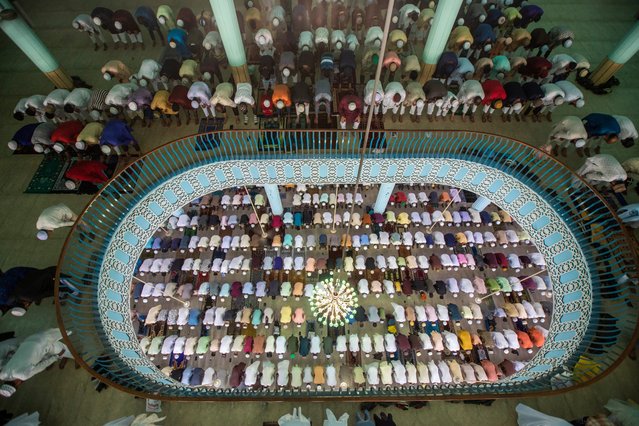
Bangladeshi Muslim faithfuls attend Eid al-Fitr prayers at the Baitul Mukarram National Mosque in Dhaka, Bangladesh, 11 April 2024. Muslims worldwide celebrate Eid al-Fitr, a two or three-day festival at the end of the Muslim holy fasting month of Ramadan. It is one of the two major holidays in Islam. During Eid al-Fitr, many people travel to visit relatives and loved ones, and children receive new clothes and money to spend on the occasion. (Photo by Monirul Alam/EPA/EFE)
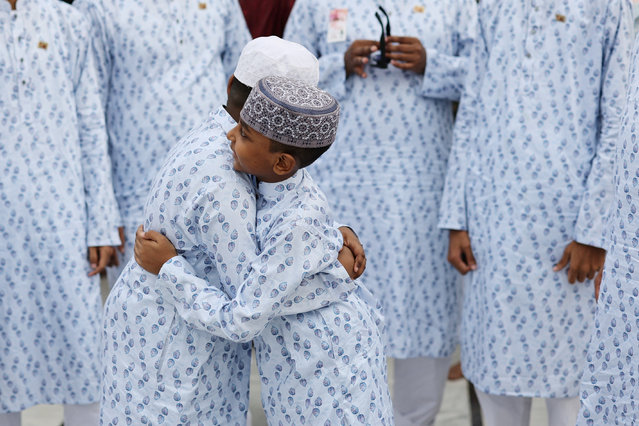
Children hug after performing the Eid al-Fitr prayer at the Baitul Mukarram National Mosque, in Dhaka, Bangladesh, on April 11, 2024. (Photo by Mohammad Ponir Hossain/Reuters)
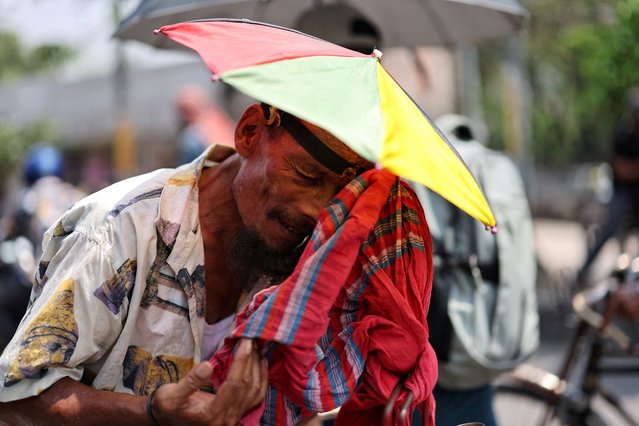
A rickshaw puller wipes sweat with a scarf during the countrywide heatwave in Dhaka, Bangladesh, on April 22, 2024. (Photo by Mohammad Ponir Hossain/Reuters)
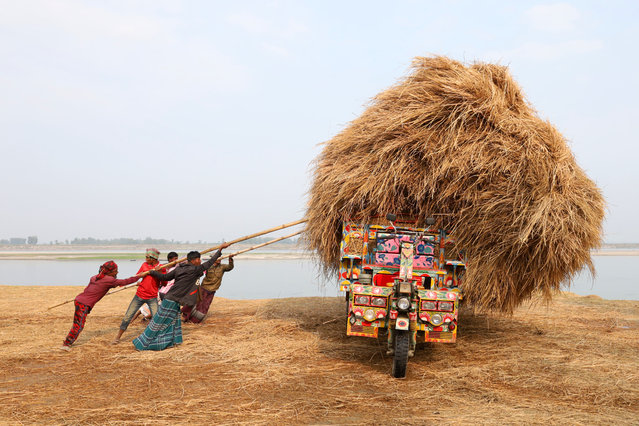
Driver carries paddy straw in small trucks and unloads in Kazipur Upazila, Sirajganj District, Bangladesh on April 22, 2024. Paddy straw is a by-product for the farmers so they usually sell it for $7 per 100kg to wholesalers. The straw is then sold by the wholesalers for between $8 - $10. Farmers use hay as food and bedding for their livestock. In addition to this, straw is used for various other purposes including house canopies and a form of biofuel. (Photo by Syed Mahabubul Kader/ZUMA Press Wire/Rex Features/Shutterstock)
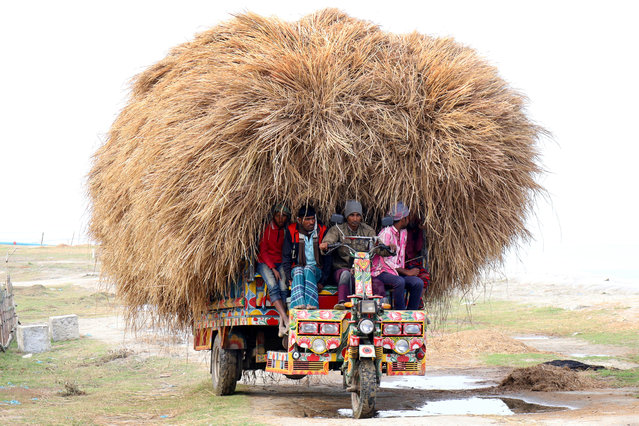
Driver carries paddy straw in small trucks and unloads in Kazipur Upazila, Sirajganj District, Bangladesh on April 22, 2024. (Photo by Syed Mahabubul Kader/ZUMA Press Wire/Rex Features/Shutterstock)
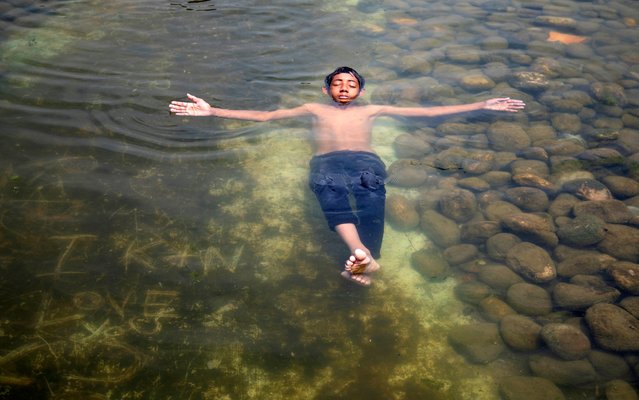
A boy cools off during the heat wave at the Suhrawardy Udyan water reserve in Dhaka, Bangladesh, 22 April 2024. According to the Bangladesh Meteorological Department (BMD) the duration of heat wave has been extended by three more days, Meteorological office issued a new waring on 22 April for next 72 hours. (Photo by Monirul Alam/EPA/EFE)
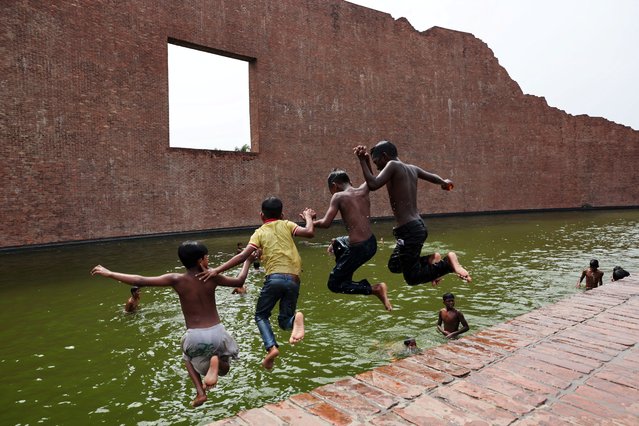
Children jump into the water body of Martyred Intellectuals Memorial at Rayerbazar, to cool themselves during a heatwave in Dhaka, Bangladesh, on April 23, 2024. (Photo by Mohammad Ponir Hossain/Reuters)
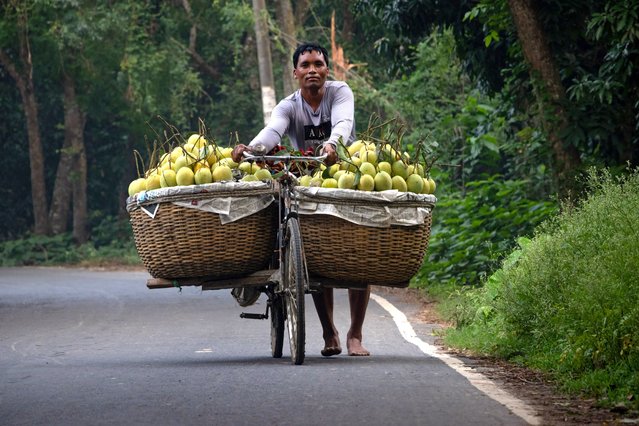
Farmers carry bicycles laden with mangoes to sell at a market in Kansat, Chapainawabganj, Bangladesh on April 23, 2024. The use of bicycles reduces transportation costs for them who can carry up to 400 mangoes on each bike. The mangoes are loaded in bicycles and pushed all the way through a forest to the Biggest Mango Market – Kansat. After picking the fruit from the trees, mango growers take them to the market by hanging two baskets on either side of their bicycles. Carrying the load by cycles is laborious as each basket contains about 40kg of mangoes. Mango – the king of fruits in Bangladesh – is one of the most delicious and popular fruits during the sunny summer. (Photo by Joy Saha/ZUMA Press Wire/Rex Features/Shutterstock)
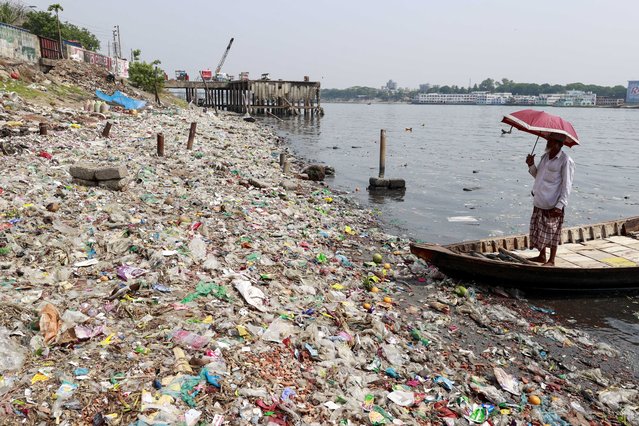
Wastage plastic material dumped on the River Buriganga, in Dhaka, Bangladesh, April 23, 2024. Plastic is being found just by digging into the soil on the banks of Buriganga. Plastic is showing up even seven feet under the ground. These plastics from the banks later sink to the river bed. It has been found that some of these plastics are even older than a decade. And these remained almost the same, unaltered. Such images surfaced in an ongoing study about the presence of plastic in the soil on Buriganga banks. There is much discussion on plastic accumulated on the river beds as well as floating on the rivers Buriganga, Balu, Turag, Dhaleshwari and Shitalakhya, the five rivers surrounding Dhaka. (Photo by Suvra Kanti Das/ABACA Press/Rex Features/Shutterstock)
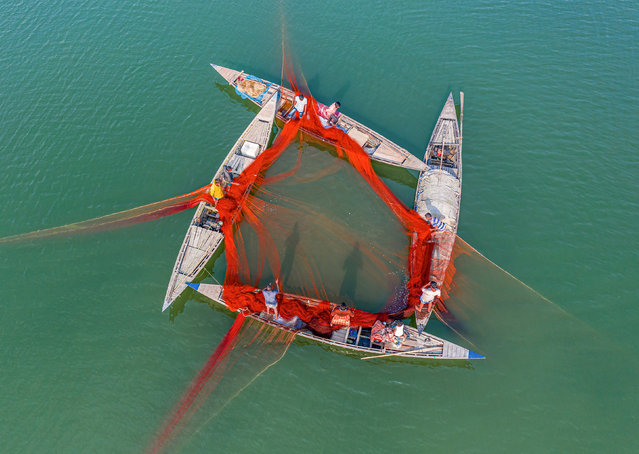
Fishermen use their boats to cast a bright red net into clear turquoise waters on the Yamuna river in Bangladesh in the last decade of April 2024. In this ancient method, eight fishermen are needed to cast the net to catch large fish like pollock, chital, rohu and catla. (Photo by Ahsanul Haque Nayem/Solent News)
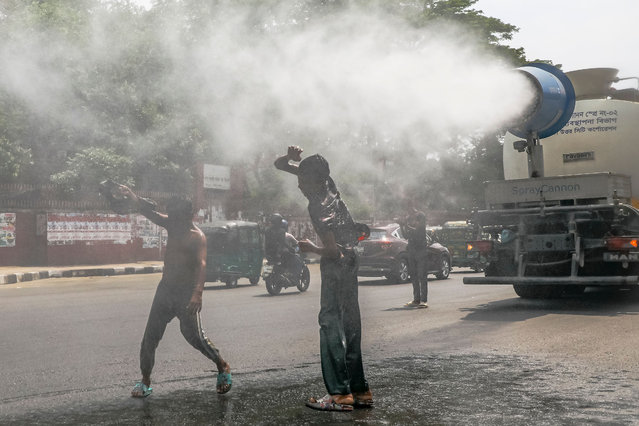
A mist cannon is blowing water particles at high speed onto the road to cool the air during the heatwave in Dhaka, Bangladesh, on April 25, 2024. (Photo by Kazi Salahuddin Razu/NurPhoto/Rex Features/Shutterstock)
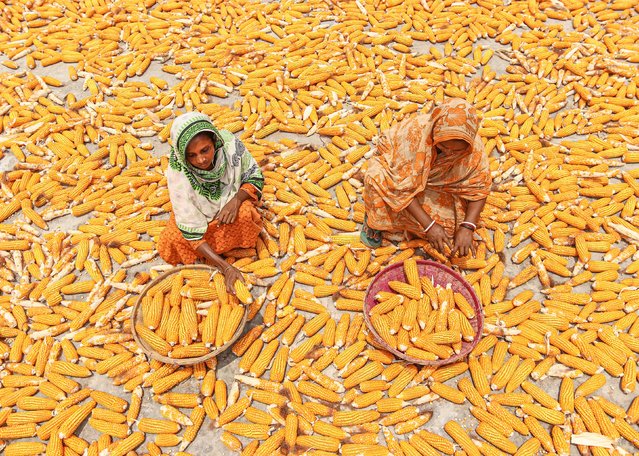
Corn is shucked and stacked in Bangladesh early May 2024 to help it dry, so that it will last longer in transit. (Photo by Abdul Hamid/Solent News)
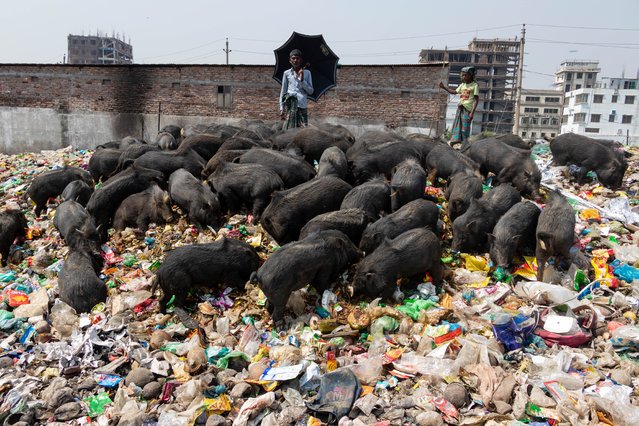
The practice of rearing pigs in a garbage dump in Narayanganj, Bangladesh on May 7, 2024 where they are mainly fed dirt from garbage piles, is a concerning and unhygienic method of pig farming. These pigs are usually raised to meet the demand for meat. Feeding pigs with such materials can pose various risks to both the animals and consumers. Pigs are omnivores, and their diet significantly impacts the quality of the meat produced. Besides, improper disposal of waste, along with the potential spread of diseases from the pigs, can harm the surrounding ecosystem. (Photo by Joy Saha/ZUMA Press Wire/Rex Features/Shutterstock)
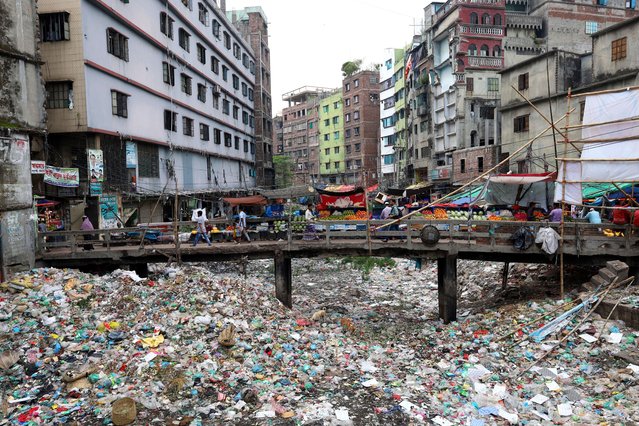
A canal in Dhaka's Keraniganj has been filled with garbage on May 15, 2024. All wastes from nearby houses, shops and garments are dumped into this canal. There is no water flow in the canal due to filling. Children play on this waste. (Photo by Syed Mahabubul Kader/ZUMA Press Wire/Rex Features/Shutterstock)
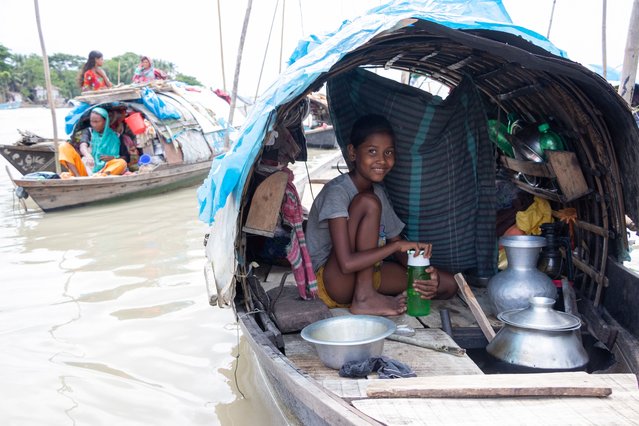
Members of the Bede ethnic group, who live, travel and earn their living on the river, on their boats in Munshiganj, Dhaka, Bangladesh on May 22, 2024. (Photo by Joy Saha/ZUMA Press Wire/Rex Features/Shutterstock)
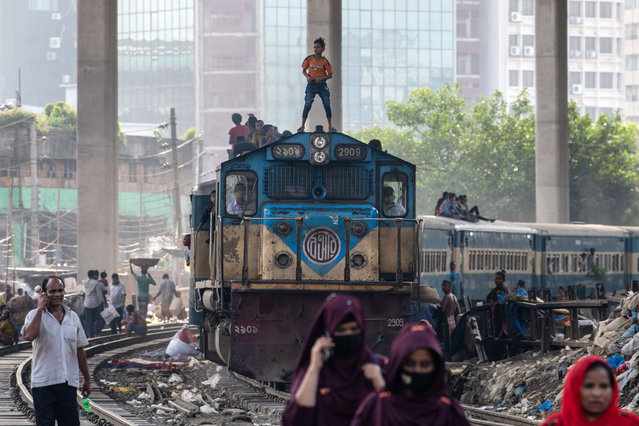
A boy is riding on top of a train as it is making its way through Kamlapur Railway Station in Dhaka, Bangladesh, on May 24, 2024. Many homeless children are living in railway stations and riding trains for fun. However, it is very dangerous, and there are calls for the authorities to prevent children from riding on train roofs. (Photo by Syed Mahamudur Rahman/NurPhoto)
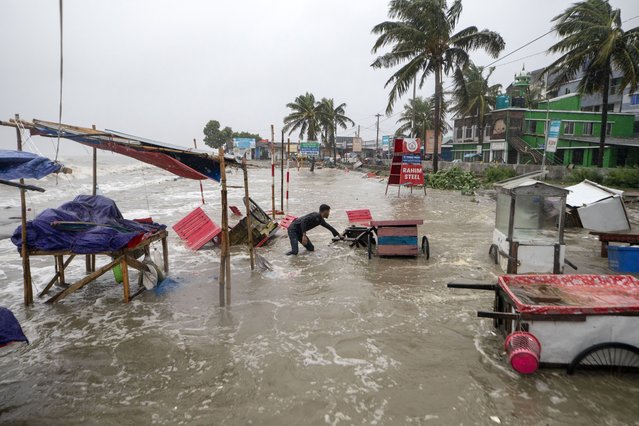
A man salvages a cart and other material as water flows on to the Kuakata beach on the coast of Bay of Bengal caused by the advancing Cyclone Remal in Barisal, Bangladesh, Sunday, May 26, 2024. (Photo by Abdul Goni/AP Photo)
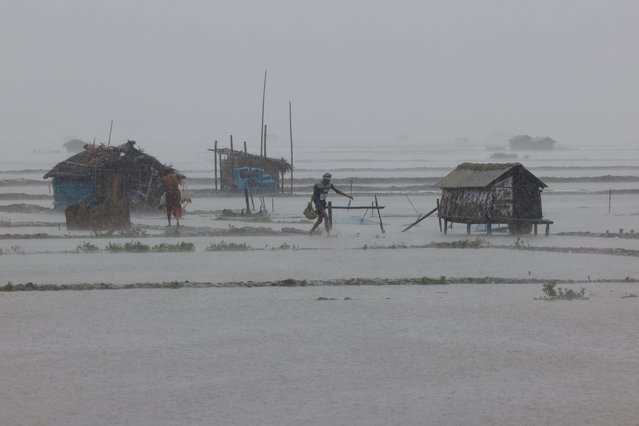
People walk along shrimp and crab farms that are flooded due to heavy rain as Cyclone Remal passes the country, in the Shyamnagar area of Satkhira, Bangladesh on May 27, 2024. (Photo by Mohammad Ponir Hossain/Reuters)
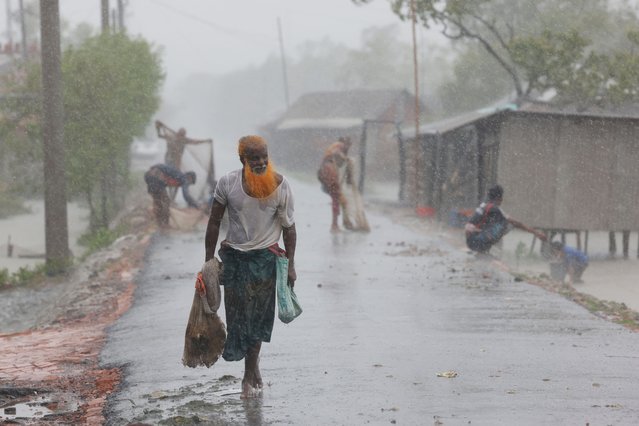
A man walks on the road with a net as people fish at the shrimp and crab farms that are flooded due to heavy rain, as Cyclone Remal hits the country, in the Shyamnagar area of Satkhira, Bangladesh, on May 27, 2024. (Photo by Mohammad Ponir Hossain/Reuters)
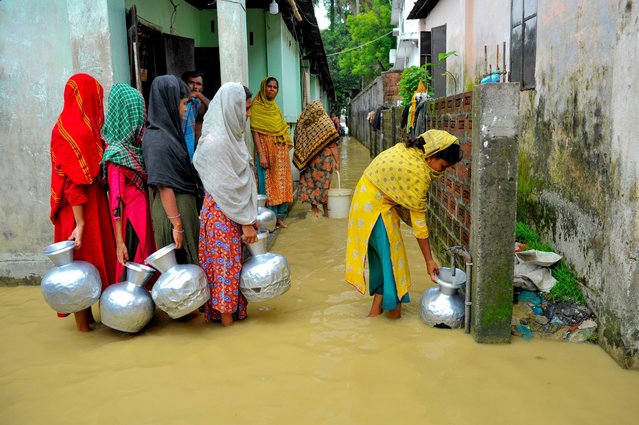
Family members collect clean water from supply pipes in Machimpur, Bangladesh on June 2, 2024, where people have been stranded after heavy flooding. Although the water has receded slowly in the last three days, there is still flood water in the low-lying areas of the city.(Photo by Md Rafayat Haque Khan/ZUMA Press Wir/Rex Features/Shutterstock)
13 Jun 2024 02:47:00,
post received
0 comments
